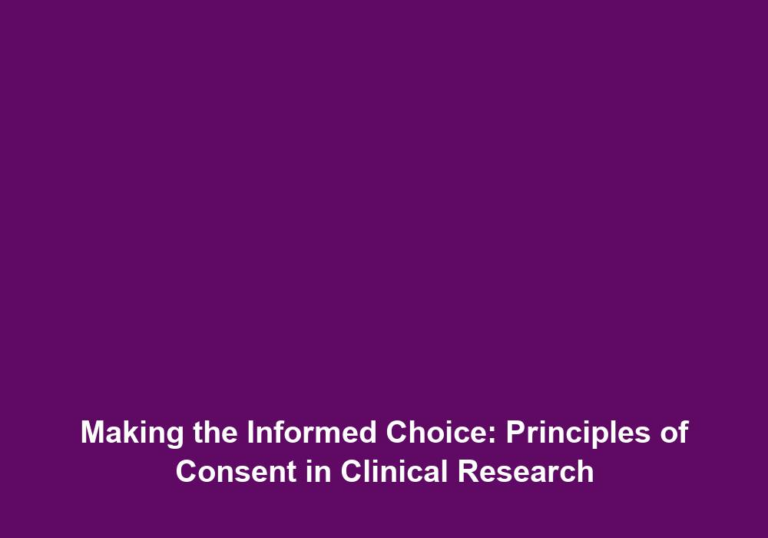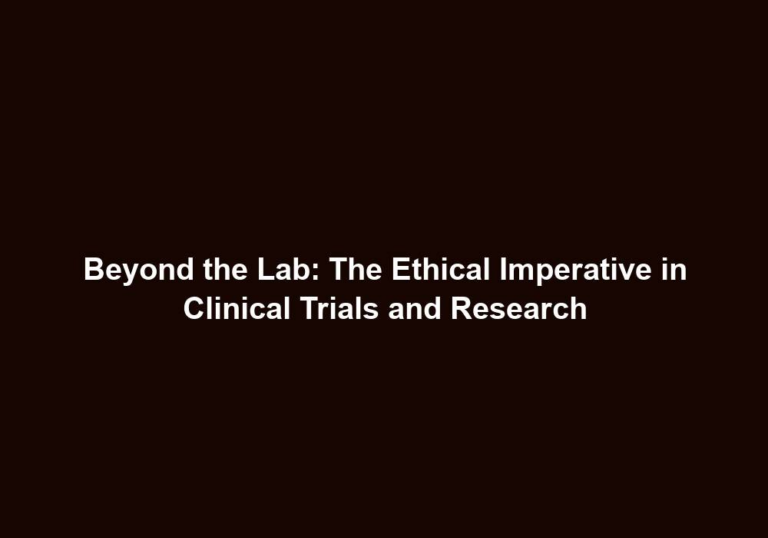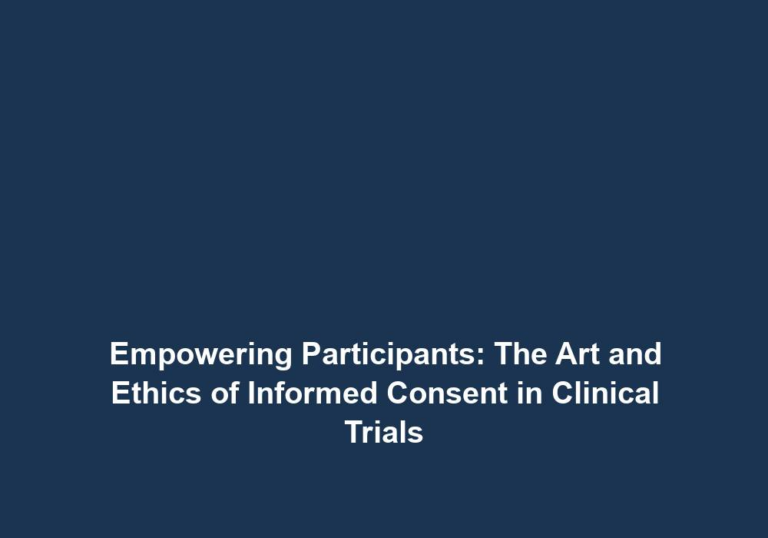Navigating Nuances: Ethical Considerations in Medical Research
Medical research plays a crucial role in advancing our understanding of diseases, developing new treatments, and improving healthcare outcomes. However, conducting medical research also raises important ethical considerations that need to be carefully navigated. In this article, we will explore some of the key ethical considerations in medical research and the guidelines that researchers must follow to ensure the protection and well-being of participants.
Importance of Ethical Considerations in Medical Research
Ethical considerations are the cornerstone of responsible and trustworthy medical research. They provide a framework for protecting the rights, privacy, and well-being of research participants. By adhering to ethical guidelines, researchers can ensure that the benefits of their research outweigh any potential risks or harm to participants.
It is essential to prioritize ethical considerations in medical research because they serve as a safeguard for participants. Ethical guidelines ensure that the research is conducted in a manner that respects the autonomy and dignity of individuals. By considering the potential risks and benefits of the study, researchers can make informed decisions that prioritize the well-being and safety of participants.
In addition, ethical considerations also contribute to the credibility and reliability of medical research. When researchers adhere to ethical guidelines, it enhances the validity and trustworthiness of their findings. This is crucial for the scientific community and society at large, as it allows for accurate and evidence-based decision-making in healthcare.
To ensure the importance of ethical considerations is upheld, researchers must undergo ethics training and education. This equips them with the necessary knowledge and skills to navigate the complex ethical landscape of medical research effectively. By incorporating ethical considerations into the research process, researchers can contribute to the overall advancement of medical science while maintaining the highest standards of integrity and respect for participants.
Informed Consent: Empowering Participants
Obtaining informed consent from research participants is essential in any medical research study. Informed consent ensures that participants have a clear understanding of the purpose, procedures, potential risks, and benefits of the study before deciding to participate. It provides an opportunity for participants to ask questions, seek clarification, and make an informed decision based on their own judgment.
To ensure the informed consent process is effective, researchers should provide comprehensive information about the study in a language that participants can understand. This includes explaining the purpose of the study, the methods, the potential risks involved, any potential benefits, and the voluntary nature of participation. By presenting the information in a clear and accessible manner, researchers empower participants to make autonomous decisions about their involvement in the study.
Additionally, researchers should allow ample time for participants to consider their decision and provide an opportunity for them to consult with trusted individuals, such as family members or healthcare providers. This promotes a supportive environment that encourages participants to fully understand the implications of their participation and make an informed choice.
It is also crucial to inform participants about their right to withdraw from the study at any time without facing any consequences. This ensures that participants feel empowered and have control over their involvement throughout the research process. By prioritizing informed consent, researchers can build trust and maintain a respectful relationship with participants, thereby upholding ethical standards in medical research.
Privacy and Confidentiality: Safeguarding Participant Information
Protecting the privacy and confidentiality of research participants is crucial in medical research. Participants must feel confident that their personal information will be kept confidential and that their privacy will be respected throughout the study. Researchers must take appropriate measures to ensure that participant data is securely stored, encrypted, and accessible only to authorized personnel.
To safeguard participant information, researchers should implement strict data protection measures. This includes using secure storage systems, encrypting sensitive data, and limiting access to authorized individuals only. By adopting these measures, researchers can prevent unauthorized access or disclosure of participant information, thereby maintaining confidentiality.
Anonymization or de-identification of participant data can further enhance privacy protections. This involves removing any identifiable information such as names, addresses, and social security numbers from the data. Instead, researchers assign unique identifiers to participants to maintain confidentiality while still allowing for data analysis and reporting.
Moreover, researchers should obtain explicit consent from participants regarding the use and storage of their data. This ensures transparency and allows participants to make informed decisions about their privacy. By prioritizing privacy and confidentiality, researchers can establish a trusting relationship with participants and uphold ethical standards in medical research.
Minimizing Risk and Harm: Balancing Benefits and Burdens
Medical research often involves a degree of risk or burden for participants. Ethical considerations require researchers to carefully evaluate and minimize these risks to the greatest extent possible while ensuring that the potential benefits justify the potential harm.
To minimize risk and harm, researchers should conduct thorough risk assessments before initiating the study. This involves identifying potential risks and developing strategies to mitigate them. For example, in clinical trials testing new medications, researchers must assess the potential risks and side effects of the experimental treatment. They must also ensure that participants are adequately informed about these risks and provide appropriate medical monitoring to detect and manage any adverse events.
Additionally, researchers should continuously monitor participants throughout the study to identify and address any emerging risks or adverse effects promptly. This includes providing regular medical check-ups, implementing safety protocols, and maintaining open lines of communication with participants. By prioritizing participant safety and well-being, researchers can minimize potential harm and uphold ethical standards in medical research.
It is important to strike a balance between the potential benefits and burdens of the research. Researchers should carefully consider whether the potential benefits outweigh the potential risks for participants. This requires an ethical evaluation of the study design, methodology, and expected outcomes. By conducting this evaluation, researchers can ensure that the research contributes to scientific knowledge while prioritizing the welfare of participants.
Vulnerable Populations: Special Considerations
Certain populations, such as children, pregnant women, prisoners, and individuals with cognitive impairments, are considered vulnerable in the context of medical research. Special ethical considerations must be applied when involving these populations to ensure their protection and well-being.
When including vulnerable populations in research studies, researchers must justify the need for their inclusion and take extra precautions to minimize potential harm. This includes conducting a thorough risk-benefit analysis, obtaining consent from legal guardians or representatives, and providing additional support and monitoring. Researchers should also consider involving independent advocates or committees to review the study and ensure the rights and welfare of vulnerable participants.
Moreover, researchers should ensure that the research protocols and methodologies are adapted to meet the specific needs and vulnerabilities of these populations. This may involve simplifying language, modifying procedures, and providing additional resources or accommodations. By considering the unique circumstances of vulnerable populations, researchers can conduct ethical research that respects their rights and well-being.
Ethical Oversight: The Role of Institutional Review Boards (IRBs)
To ensure adherence to ethical guidelines, most research institutions have established Institutional Review Boards (IRBs). IRBs are independent committees responsible for reviewing research proposals to assess their ethical implications and ensure the protection of participant rights.
Researchers are required to submit their study protocols and informed consent documents to the IRB for review and approval before proceeding with the research. The IRB evaluates the study design, participant protections, and informed consent process to ensure compliance with ethical standards. They may suggest modifications or require additional information before granting approval.
The involvement of IRBs provides an additional layer of ethical oversight in medical research. IRBs consist of multidisciplinary experts who assess the research from various perspectives, such as ethics, law, and participant advocacy. Their objective evaluation helps to ensure that the research adheres to ethical principles and safeguards the rights and well-being of participants.
Conclusion
Navigating the ethical considerations in medical research is paramount to upholding the well-being and rights of research participants. By obtaining informed consent, safeguarding privacy and confidentiality, minimizing risks, considering vulnerable populations, and seeking ethical oversight through IRBs, researchers can conduct studies that advance medical knowledge while respecting the ethical principles that underpin medical research. Through a thoughtful and comprehensive approach to ethical considerations, researchers can contribute to the betterment of healthcare and society as a whole.
Note: This article was generated by OpenAI’s GPT-3 language model. It has been reviewed and edited by a human expert to ensure accuracy and appropriateness.






